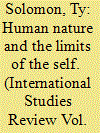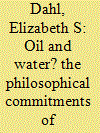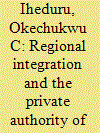|
|
|
Sort Order |
|
|
|
Items / Page
|
|
|
|
|
|
|
| Srl | Item |
| 1 |
ID:
113747


|
|
|
|
|
| Publication |
2012.
|
| Summary/Abstract |
International Relations (IR) has seen renewed interest in the nuanced insights of Hans Morgenthau which had long been obscured by neorealism. This new "reflexive realism," however, far from exhausts the range of Morgenthau's thinking about politics or social theory. In the 1960s, Morgenthau lamented the inability of modern thinking to recognize the connections between power and love, which he argued was symptomatic of the inability to fully understand either one. For Morgenthau, both power and love were rooted in the need to overcome the loneliness of the human condition. Through pursuits of both power and love, people seek, through others, to avoid the self's insufficiency. Yet, these pursuits are mutually subversive. The frustration of love blends into the imposition of power, and the pursuit of power is ultimately an extension of the search for love. In exploring these issues, this paper argues that Morgenthau's insights have implications for at least three core issues of contemporary concern in IR. First, they suggest fresh perspectives on recent discussions of human nature in IR. Second, Morgenthau's analysis contributes to the burgeoning interest in emotions in IR, pointing to the neglect of love in this literature, and illustrates his attempt to theorize what may be called the affective limits of the self. Third, these insights can be used to enrich recent discussions of realist constructivism in IR.
|
|
|
|
|
|
|
|
|
|
|
|
|
|
|
|
| 2 |
ID:
113748


|
|
|
|
|
| Publication |
2012.
|
| Summary/Abstract |
This paper argues that the conventional wisdom about the European Union (EU) is wrong. It questions whether the EU is now or ever has been on the brink of collapse. And it offers reasons for believing that an international organization made up entirely of liberal democratic states will exhibit great resilience and impressive staying power. We can never say never when discussing the prospect of an EU collapse, but we can make a strong case that the democracies that comprise the EU will continue to find ways to muddle through.
|
|
|
|
|
|
|
|
|
|
|
|
|
|
|
|
| 3 |
ID:
113749


|
|
|
|
|
| Publication |
2012.
|
| Summary/Abstract |
While there have been important studies that have mapped the fields of peace studies (PS) and conflict resolution (CR), the focus usually has been on tracing their historical evolution and typical areas of application. In contrast, this article aims to examine PS and CR's philosophical assumptions and commitments, topics more rarely investigated. Rather than assuming that CR and PS are analyzing, diagnosing, and addressing conflict in the same way, this study will trace their respective philosophical genealogies (including, where possible, variations within each) and the concrete implications of these stances in terms of intellectual wagers about power, truth, structure, and conflict. These findings will tell us more about what is happening in these two fields and guide future study.
|
|
|
|
|
|
|
|
|
|
|
|
|
|
|
|
| 4 |
ID:
113750


|
|
|
|
|
| Publication |
2012.
|
| Summary/Abstract |
A lacuna in the networked global economy and private regulatory authority literatures-hence the main theoretical contribution of this article-involves situations where regulatory authority is ceded or outsourced to nonstate business actors that, in addition to their commercial mission, espouse and actually integrate their profit motive with political and economic missions that can enhance or undermine regional integration effectiveness. Such identity-based, dual-mission regional business actors are more likely to promote regional economic integration than their foreign counterparts because these firms often define the region as the centerpiece of their investment decisions. The melding of their "region-centricity" with the profit motive may suggest the capacity of states and nonstate actors to "tame" or "regionalize" globalization or even challenge the existing global order. The empirical evidence is drawn from an unlikely source, that is, cross-border, dual-mission regional banks in West Africa to whom governments and INGOs have ceded or "outsourced" critical central banking regulatory authority, empowering or enabling them to (i) act as regional development banks through public-private partnerships; (ii) create and regulate financial instruments as surrogate common currency and regional payments systems; and (iii) cross-border supervision of regional bank subsidiaries and branches. Expanded private authority of regional banks is creating putative region-wide norms of financial integration and behavioral changes among banks and other sectors and governments while amplifying the limits of private-sector-led financial integration. The study fills a gap in the comparative regionalism literature that continues to neglect, misidentify, or undervalue the African experience.
|
|
|
|
|
|
|
|
|
|
|
|
|
|
|
|
|
|
|
|
|